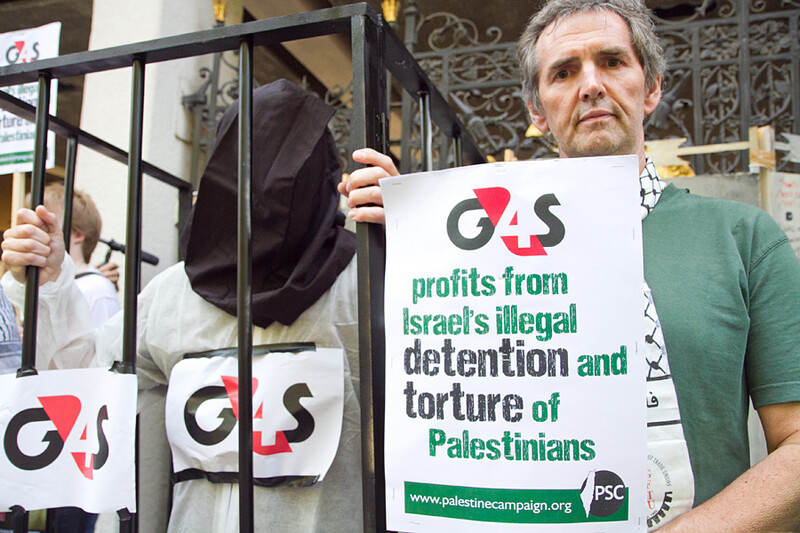Activism and BDS Beat 21 May 2015

G4S equips prisons where Palestinians are tortured. (Palestine Solidarity Campaign/Flickr)
The University of Helsinki in Finland has canceled its security contract with G4S over its role in Israel’s prison system.
Palestinian organizations launched a boycott and divestment campaign against G4S in 2012 because the British firm provides security equipment and services to Israeli prisons where thousands of Palestinians are detained.
Detention without trial and use of torture, including of children, are widespread in Israel’s prison system.
The decision by the University of Helsinki follows a campaign that was backed by unions representing its academics and students.
In April 2014, a petition was handed to the university’s administration, urging it to drop G4S.
Shortly afterwards, the university director’s Jukka Kola tweeted that the contract with G4S would be examined.
As a result of the cancellation, security services at the university will now be provided by a Finnish company called Turvatiimi.
“We welcome this decision by the university. We’re delighted that so many parts of the University of Helsinki community joined us in opposing the role of G4S in Israel’s human rights abuses,” said Teivo Teivainen, one of the academics involved in launching the campaign.
Addameer, a group campaigning for the rights of Palestinian prisoners, welcomed the decision.
““In light of human rights violations committed against Palestinian prisoners with the complicity of G4S, Addameer welcomes this decision by the University of Helsinki,” said Hanan Hammoudeh from Addameer.
“War crimes on an industrial scale”
The decision at the University of Helsinki adds to a growing list of successful campus campaigns against G4S.
Universities in Bergen and Oslo in Norway have both canceled contracts with G4S in recent years. In 2013, King’s College London and Southampton University in the UK chose not to award G4S major security contracts following vigorous student campaigns.
Earlier this year, the student union at University College London voted to stop using G4S as a security contractor for its premises.
Student union officials at the University of Essex recently confirmed that they have ended a contract with G4S.
“It is very clear to Essex students that we do not wish our academic institution to be tied to an organization which not only furnishes, but benefits from, an apparatus which contributes towards war crimes on an industrial scale,”Adrià Porta Caballé, the campaigns officer with the student union, told me.
Student unions at Kent, Durham, Edinburgh and Dundee universities have all also voted to terminate contracts they hold with G4S.
Keep the pressure
Last month, BDS South Africa announced that more than twenty businesses had pledged to stop using G4S as a security provider.
Companies, unions, universities and charities across the world have now terminated contracts with G4S over its support for Israel’s prison system.
The Bill Gates Foundation and the United Methodist Church in the US have both divested from G4S as a result of BDS activism.
These latest high-profile contract losses at universities will surely rattle G4S bosses as they prepare for a protest at the 4 June meeting of the firm’s shareholders.
The demonstration has been called by Palestine solidarity activists and a range of groups that are campaigning against the role of G4S in the UK’s refugee detention and housing systems.
At its shareholders’ meeting last year, G4S announced that it “does not intend” to renew its contracts with the Israel Prison Service when they expire in 2017.
But as a new fact sheet published by Addameer explains, the campaign against G4S must not stop.
“G4S has not set out this commitment in writing and continues to profit from Israel’s abhorrent prison system,” the fact sheet says. ”A company that commits serious human rights abuses cannot be trusted to keep its word, and promises to end criminal behavior at some point in the future should not mean G4S escapes accountability. Campaign pressure against G4S must continue until it entirely ends its role with the Israel Prison Service and all aspects of Israel’s apartheid regime.”
Tags
- BDS
- Addameer
- G4S
- University of Helsinki
- University College London
- University of Essex
- war crimes
- apartheid
- Israel Prison Service
- Finland
- Jukka Kola
- Turvatiimi
- divestment
- Teivo Teivainen
- Bergen
- Oslo
- Norway
- Adrià Porta Caballé
- Kent
- Durham
- Edinburgh
- Dundee
- BDS South Africa
- Bill Gates Foundation
- United Methodist Church
- Palestinian prisoners
- torture
- University of Southampton






Comments
I don't know what the broader
Permalink Jonathan Kramer replied on
I don't know what the broader implications of this are, and hope someone with more knowledge than me might be able to analyze it.
https://www.google.co.il/?gfe_...
This graph shows G4S stocks. Set the graph window to 5 years. There is no noticeable trend of the share price declining in value. Indeed, over the past few years the share value has gone up -- just as the boycott campaign against it has turned most intense.
I'm not sure if this is an economically-sound way of analyzing BDS' effectiveness, but it's the best I've got right now.
I assume that the money G4S generates in university contracts is negligible compared to what it must rake in from government ones.
fluctuations in that chart
Permalink tom hall replied on
The graph shows a steep drop in share price occurring in mid-2013, amounting to a loss of 100 points, or a third of overall value. Like you, I don't have the technical knowledge to assess this sudden, drastic decline, but it may indeed be related to a spate of divestment resolutions at the time, and the subsequent loss of contracts.
Following this period, the company has made a gradual recovery, until its current share price now approaches that of the earlier peak. A new strategy may have been instituted by the company's directors in response to BDS-related losses. This would indicate a complex struggle between contending forces, rather than outright defeat for advocates of boycott.
Of course, all this is supposition on my part. Other factors may play a preponderant role in these fluctuations. But any claim that G4S is immune to the anti-apartheid boycott would have to rely on harder and more extensive evidence than a single graph. At any rate, a rapid and steep decline was registered in the value of shares, and the company is certainly losing public support and contracts around the world.